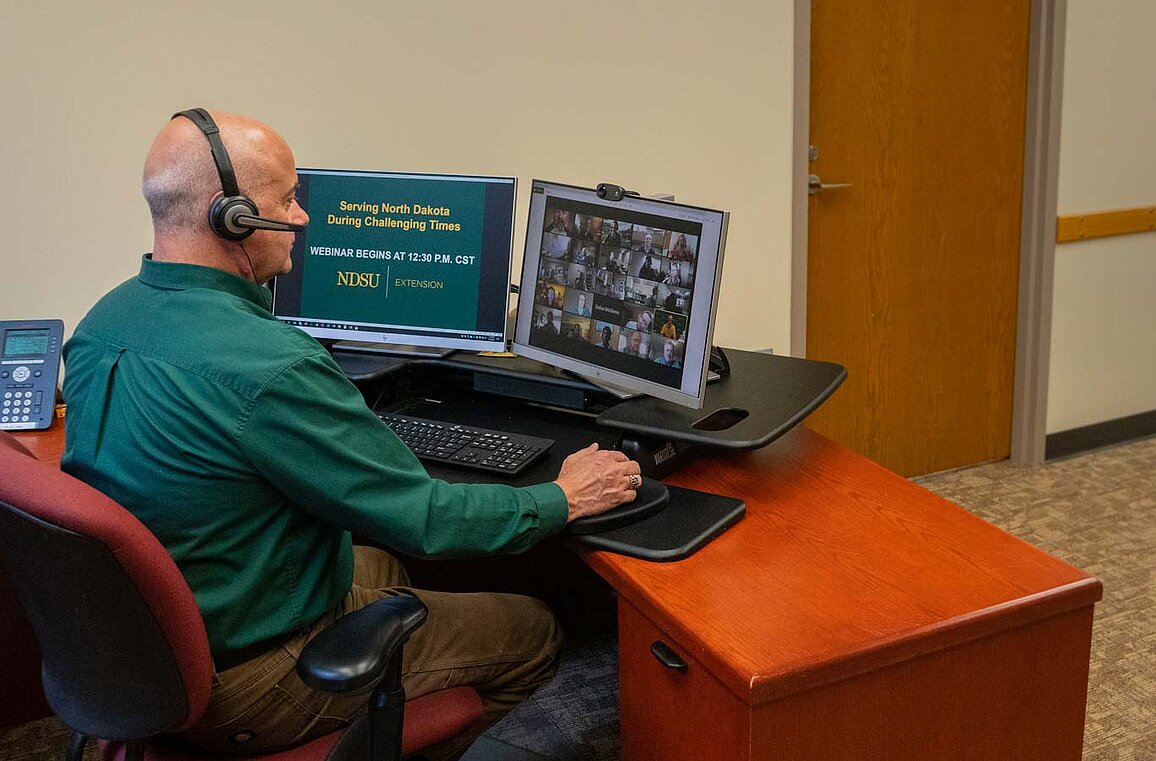NDSU Responds Immediately and Innovatively to COVID-19

When North Dakota’s COVID-19 response started in early March, the College of Agriculture, Food Systems, and Natural Resources; North Dakota Agricultural Experiment Station; and NDSU Extension adjusted quickly.
“I’m very proud of our faculty and staff who have met many challenges adjusting but now are carrying out their teaching, research and Extension responsibilities in new and innovative ways,” says Greg Lardy, vice president for Agricultural Affairs. “Many have worked more than full time while also caring for children at home and often helping them with their schoolwork. We don’t know how long this situation will last, but I’m confident our personnel will continue to serve our constituents in the new normal.”
Every academic department, Research Extension Center and county Extension office has many examples of how they’ve switched to remote work. Here are just a few:
College of Agriculture, Food Systems, and Natural Resources
Rob Maddock’s Live and Carcass Evaluation and Marketing students had two one-hour lectures and one two-hour lab in person each week.
“Now the course is asynchronous since students may be busy with other classes or work (often on their farms or with internships), or have unreliable internet access,” he says. “I’m recording voice-over PowerPoint to explain concepts.”
For lab, Maddock takes photos or short videos of the live animals. The livestock then are slaughtered in the meats lab and he takes photos of the carcasses, demonstrating how carcass traits are measured and the actual measurements. Students evaluate the live animals and carcasses, then Maddock provides the actual measurements and the students use pricing reports to determine value.
Maddock says, “It is more difficult to point out how estimates of live traits are being evaluated, but the students are doing a good job of making realistic estimates and determining prices.”
N.D. Agricultural Experiment Station
Greenhouse manager Julie Hochhalter says the complex went from having 15 student workers to three, yet every day someone walks 2.3 miles to sanitize every door handle and other surfaces that are regularly touched by faculty and staff who continue to use the greenhouse.
“We have 86 rooms, and they’re all full now,” Hochhalter says. “Usually the greenhouse is less busy in the summer, but researchers are asking for more greenhouse space since they may not be able to travel to field plots this summer.
“In the greenhouse, we practice physical distancing, encourage everyone to wear masks and have more sanitizer around the building,” Hochhalter says. “With card swipes, we can trace everyone who enters the building, and we’ve had them sign updated procedures to get access.”
NDSU Extension
- Agricultural economics specialists host a weekly webinar to provide updates on marketing situations.
- Several family and community wellness (FCW) agents led Facebook Live sessions on handwashing and nutritious cooking, often with their children helping.
- Youth from 17 states took part in the first in a series of virtual livestock showmanship seminars.
- A team of agents is developing farm safety information for expected spring challenges.
- Community development specialists have hosted virtual town halls for the state’s community developers.
- Many 4-H clubs and councils are meeting virtually.
- Parent educators use Facebook Live to connect with families and share parenting tools, especially ones that might be useful during these challenging times.
- FCW agents inserted family conversation starter cards in lunches for schoolchildren.
- With more interest in growing food, agents and specialists are developing videos about gardening.
----
For more information: Greg Lardy, gregory.lardy@ndsu.edu , 701-231-7660, www.ndsu.edu/vpag


